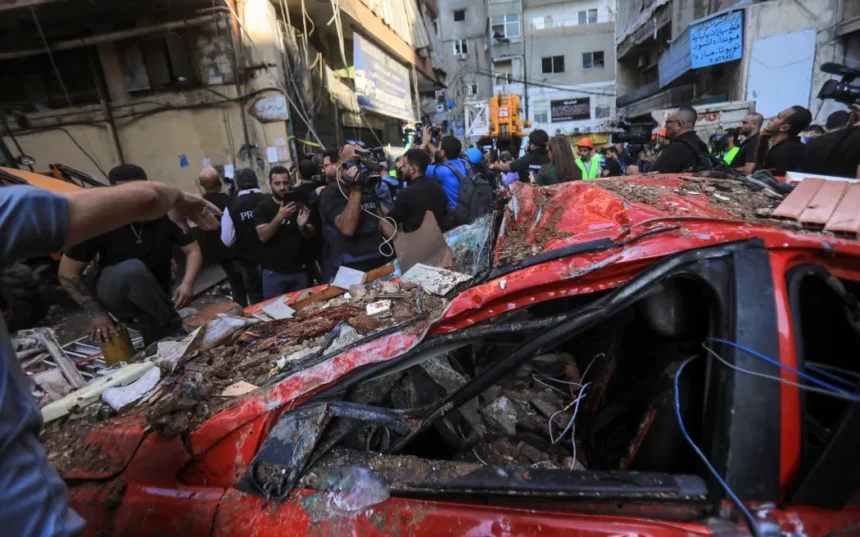The New Red Line: Israel’s First Strike on Beirut in Months Targets Hezbollah’s De Facto Chief of Staff
The fragile stability that characterized the Lebanese capital has been shattered. On Sunday, November 23, 2025, Israel launched a targeted airstrike deep inside Beirut’s southern suburbs (Dahieh), a heavily populated area and a widely recognized Hezbollah stronghold. The operation, which Israeli authorities confirmed was aimed at the group’s Chief of Staff, Ali Tabtabai (also known as Haytham ‘Ali Tabataba’i or Abu Ali al-Tabtabai), marks a significant, calculated escalation in the ongoing hostilities between Israel and the powerful, Iran-aligned militia.
This is not merely another cross-border skirmish; it is the first strike on Beirut since June, signaling a dramatic shift in Israel’s willingness to operate in the heart of Lebanon and target the group’s highest-ranking military command. The implications for regional security dynamics, the future of the November 2024 ceasefire agreement, and Lebanon’s already-strained political stability are immense. The world is watching for the inevitable retaliation from a group known for its robust military capabilities and its deep integration into the regional Axis of Resistance.
The High-Value Target: Who is Ali Tabtabai?
The choice of target—Hezbollah’s chief of staff—underscores the high-stakes nature of the operation. Ali Tabtabai is consistently identified by Israeli and U.S. intelligence as one of the most critical and powerful military figures within the organization, often described as its number two leader.
The Architect of Rearmament
- Role and Command: Tabtabai is alleged to be the de facto chief of staff or the head of the Jihad Council’s military wing, making him central to the group’s combat readiness and operational planning. After the devastating losses sustained by Hezbollah in previous conflicts, his primary role has been overseeing the meticulous rebuilding, rearmament, and organizational restructuring of the group’s military capabilities.
- International Status: His importance is not just internal; the United States designated Tabtabai as a global terrorist in 2016 and offered a reward of up to $5 million for information leading to him, highlighting his long-standing role in the group’s operational leadership, including alleged activities in both Syria and Yemen.
- Strategic Impact: Targeting a figure of this caliber aims to deliver a serious blow to Hezbollah’s command structure, disrupt its long-term strategy for weapon procurement (particularly from Iran), and degrade its ability to coordinate future large-scale military operations. This type of strike targets the intellectual capital of the organization, a strategy of decapitation that is often more destabilizing than striking mere infrastructure.
The Location and Its Significance
The strike was carried out in Haret Hreik, part of the southern suburbs of Beirut, a neighborhood synonymous with Hezbollah’s political and security presence.
- Hezbollah’s Center of Gravity: Dahieh is the group’s uncontested stronghold, often housing key command centers, social services offices, and the residences of its senior figures. Striking this location sends a clear message: no sanctuary is inviolable.
- Violation of Ceasefire: The strike is the first on the Lebanese capital in months, marking a clear escalation that goes beyond the localized, near-daily skirmishes that have plagued the Israeli-Lebanese border region since the November 2024 ceasefire. It signifies a willingness to violate the informal rules of engagement that had largely kept Beirut out of the direct line of fire.
The Context: Intensifying Pressure and a Failed Ceasefire
The November 23rd strike does not occur in a vacuum; it is the most dramatic event in weeks of rising tensions and political pressure surrounding the unresolved conflict.
Escalation on the Border
Despite the November 2024 cessation of hostilities, which ended a significant period of fighting, the border area has remained tense:
- Israeli Violations: Lebanon and UNIFIL (United Nations Interim Force in Lebanon) have repeatedly accused Israel of violating the ceasefire, maintaining a military presence in disputed border areas, and conducting regular airstrikes across southern Lebanon, claiming to target Hezbollah members and infrastructure. The Lebanese Health Ministry has reported that over 330 people have been killed by Israeli fire since the ceasefire took effect.
- Hezbollah’s Stance: Israel claims that Hezbollah is actively attempting to rebuild its military capabilities in southern Lebanon, in defiance of the agreement’s implicit requirement that non-state armed groups disarm. Hezbollah maintains that the disarmament clause only applies south of the Litani River and continues to refuse to disarm or cease its operations, which it views as legitimate resistance.
Political and Diplomatic Squeeze
The strike comes amid a coordinated diplomatic and military pressure campaign against the Lebanese government to fully implement a plan to disarm Hezbollah.
- US Pressure: The United States has been actively involved, with diplomats labeling Lebanon a “failed state” and urging the Lebanese military to aggressively implement its own plan—approved by the government in September—to disarm Hezbollah by the end of the year.
- Negotiation Push: Lebanese President Joseph Aoun recently stated that the country has “no choice” but to negotiate a resolution to the border disputes and the long-term status of Hezbollah’s armed wing, a position fiercely resisted by Hezbollah itself, which sees direct negotiations with Israel as an unacceptable concession. The strike may be calculated to increase the Lebanese government’s domestic pressure to take decisive action.
The Legal and Humanitarian Fallout
The strike on a densely populated civilian area, regardless of the target’s identity, carries severe legal and humanitarian consequences that immediately draw international condemnation and raise the risk of a wider conflict.
Civilian Casualties and Risk
- The Immediate Toll: Lebanese medical sources reported that at least two people were killed and two dozen were wounded and taken to hospitals in the area. A Hezbollah parliamentarian quickly condemned the attack, stressing that the neighborhood is a civilian area void of military presence.
- Operational Risk: Targeting a high-value individual within a civilian environment inherently places residents at extreme risk. The use of explosive ordnance in urban settings, especially one as densely populated as Dahieh, raises serious questions under international humanitarian law concerning proportionality and the distinction between combatants and civilians.
- Psychological Impact: Residents immediately rushed out of apartment buildings, fearing further strikes. The attack inflicts widespread psychological trauma and reinforces the sense of insecurity in the capital, which had previously managed to maintain some distance from the direct fighting.
Implications for the Ceasefire
While the ceasefire has been strained for months, a strike on the capital and a high-ranking military leader pushes the agreement closer to total collapse.
- Precedent of Escalation: This action sets a dangerous new precedent for the scope of Israeli operations. Hezbollah has often stated that strikes on Beirut and the killing of its top commanders are red lines that demand a significant, non-localized response.
- Axis of Resistance: As a key component of the Iranian-led Axis of Resistance, Hezbollah’s response will be carefully calibrated to satisfy its domestic and regional allies. A failure to respond decisively would signal weakness, while an overly aggressive response could trigger the full-scale conflict that both Israel and Lebanon’s government have ostensibly sought to avoid.
Live Daily Information: The Pope’s Visit and Global Reaction
As of today, Sunday, November 23, 2025, the international community is reacting with heightened concern, compounded by a major upcoming event that now faces severe risk.
- Papal Visit: The strike comes just days before Pope Leo XIV is scheduled to visit Lebanon. The attack on Beirut’s suburbs places the entire security infrastructure of the country under intense scrutiny and may force a reconsideration or postponement of the visit, which was intended to offer a message of peace and solidarity to the multi-confessional nation.
- US Response: A senior U.S. official informed reporters that Israel did not notify Washington in advance about the strike, although a second official indicated the U.S. had been aware for days that Israel was planning to escalate strikes in Lebanon. This lack of explicit, real-time coordination suggests an Israeli desire to act decisively, potentially without direct external oversight or constraint.
- Hezbollah’s Silence: As of the latest reports, Hezbollah has made no official comment regarding the strike or the fate of Ali Tabtabai. This silence is strategically loaded, suggesting that the group is in a period of intense deliberation regarding the nature and scope of its response. The longer the silence, the more calculated and possibly more significant the eventual retaliation may be.
- Domestic Lebanese Reaction: Lebanese authorities have been actively cordoning off the area of the strike and managing the humanitarian consequences. Hezbollah parliamentarians and local leaders have been highly vocal in their condemnation, fueling popular anger against the Israeli action and reinforcing the group’s narrative of being the sole protector of Lebanon’s sovereignty against foreign aggression.





